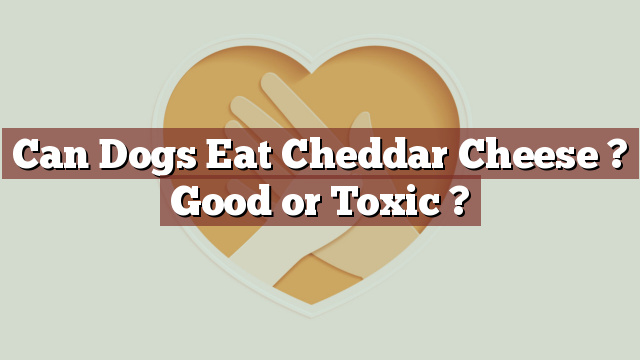Can Dogs Eat Cheddar Cheese? Good or Toxic?
As responsible dog owners, it is essential to be aware of the foods that are safe for our furry friends to consume. Cheddar cheese is a popular and delicious food that many of us enjoy, but can our canine companions safely indulge in this dairy delight? In this article, we will explore whether dogs can eat cheddar cheese and determine if it is good or toxic for them.
Nutritional Value of Cheddar Cheese: Essential Information for Dog Owners
Cheddar cheese is known for its rich and creamy taste, but it is also packed with important nutrients. This dairy product is a good source of protein, calcium, phosphorus, and vitamins A and B12. These nutrients play a vital role in supporting a dog’s overall health, including strong bones and teeth, muscle development, and a healthy immune system.
Can Dogs Eat Cheddar Cheese? Discover if it is Safe or Toxic for Your Furry Friend
Yes, dogs can eat cheddar cheese, but it is important to moderate their intake and take certain precautions. While cheddar cheese is generally safe for dogs, it should be given in small quantities as a treat or an occasional addition to their meals. Some dogs may be lactose intolerant or have sensitivities to dairy products, so it is crucial to monitor their reaction when introducing cheddar cheese into their diet.
It is worth noting that cheddar cheese, like any high-fat food, can lead to weight gain and obesity in dogs if consumed in excess. Additionally, too much cheese can cause digestive issues, such as diarrhea or stomach upset. Therefore, it is recommended to give cheddar cheese to dogs in moderation and as part of a balanced diet.
Potential Risks or Benefits of Feeding Cheddar Cheese to Dogs: Important Considerations
Feeding cheddar cheese to dogs can have both risks and benefits. On the positive side, the protein and calcium content in cheese can be beneficial for dogs, especially those with dietary restrictions or picky eaters. Cheese can also be used as a training tool or a way to administer medication.
However, it is crucial to be aware of the potential risks associated with feeding cheddar cheese to dogs. The high-fat content in cheese can lead to pancreatitis, a serious condition that causes inflammation of the pancreas. Dogs with pancreatitis may experience symptoms such as abdominal pain, vomiting, and loss of appetite. Therefore, it is important to avoid giving cheddar cheese to dogs already prone to pancreatitis or with a history of digestive issues.
What to Do if Your Dog Eats Cheddar Cheese: Expert Tips and Guidelines
If your dog accidentally consumes cheddar cheese or you suspect they have eaten too much, there are a few steps you can take. Firstly, observe your dog for any signs of discomfort or digestive issues. If your dog experiences vomiting, diarrhea, or any other concerning symptoms, it is recommended to consult a veterinarian for guidance. The vet may suggest specific dietary changes or medications to alleviate any potential issues.
Conclusion: Making Informed Decisions About Cheddar Cheese for Your Canine Companion
In conclusion, dogs can safely enjoy cheddar cheese as an occasional treat, as long as it is given in moderation and the dog does not have any known sensitivities or health conditions. Cheddar cheese can provide some nutritional benefits, but it is important to be mindful of the high-fat content and potential risks associated with overconsumption. As responsible pet owners, it is always best to consult with a veterinarian before introducing any new foods into your dog’s diet to ensure their health and well-being.
Thank you for investing your time in exploring [page_title] on Can-Eat.org. Our goal is to provide readers like you with thorough and reliable information about various dietary topics. Each article, including [page_title], stems from diligent research and a passion for understanding the nuances of our food choices. We believe that knowledge is a vital step towards making informed and healthy decisions. However, while "[page_title]" sheds light on its specific topic, it's crucial to remember that everyone's body reacts differently to foods and dietary changes. What might be beneficial for one person could have different effects on another. Before you consider integrating suggestions or insights from "[page_title]" into your diet, it's always wise to consult with a nutritionist or healthcare professional. Their specialized knowledge ensures that you're making choices best suited to your individual health needs. As you navigate [page_title], be mindful of potential allergies, intolerances, or unique dietary requirements you may have. No singular article can capture the vast diversity of human health, and individualized guidance is invaluable. The content provided in [page_title] serves as a general guide. It is not, by any means, a substitute for personalized medical or nutritional advice. Your health should always be the top priority, and professional guidance is the best path forward. In your journey towards a balanced and nutritious lifestyle, we hope that [page_title] serves as a helpful stepping stone. Remember, informed decisions lead to healthier outcomes. Thank you for trusting Can-Eat.org. Continue exploring, learning, and prioritizing your health. Cheers to a well-informed and healthier future!

